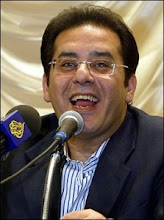Saturday, January 30, 2010

Opposition activist Ayman Nour announced yesterday his desire to run for president in Egypt’s next presidential polls, downplaying the effect of what he called the “legal stumbling blocks” the Government allegedly puts on the opposition’s way to presidency.
“It’s necessary for everyone of us to act now to rescue the future of this country,” Nour said.
“Egypt’s future is in danger and a quick action is required if this country is to continue to hold,” he told The Gazette in an interview.
Nour, the founder of the opposition el-Ghad (Tomorrow) Party, called for the formation of a new constitution and a transitional cabinet to be headed by former International Atomic Energy Agency chief Mohamed el-Baradie to prepare Egypt for what he called “fair” elections.
Nour came a distant second to Egypt’s incumbent President Hosni Mubarak in the country’s first contested presidential elections in 2005.
Some people say, Nour, who was previously convicted and sent to five years in jail for fabricating party documents, has many legal hindrances ahead if he wants to run for president.
He, however, says he had loaded his guns with the necessary legal arguments and documents to sort this legal problem out.
“If my party chooses to field me as a candidate in the elections, I would seek ways to find a solution to this problem,” Nour said.
“My party would ratchet up the necessary internal and external pressure to make this possible,” he added, without elaboration.
Members from Nour’s party are due to meet on Friday to agree whether they will pick him as
the party‘s presidential candidate.
Despite this, he has already started his campaign by touring more than 20 Egyptian cities to meet ordinary citizens and talk to them about his programme.
Nour, in his mid forties and a lawyer by profession, says he had found support everywhere he went, making him encouraged even more to run for president.
Mubarak, who has been ni power swince 1981, has not said yet wheite he will run for a 6th six-year term in office.
But in a recent interview with the Police Magazine, the President said he would welcome candidates who would “serve” the people.
Heartened by this, Nour is optimistic about his prospects in the elections. “I found support everywhere and this gives me hope,” Nour said.



